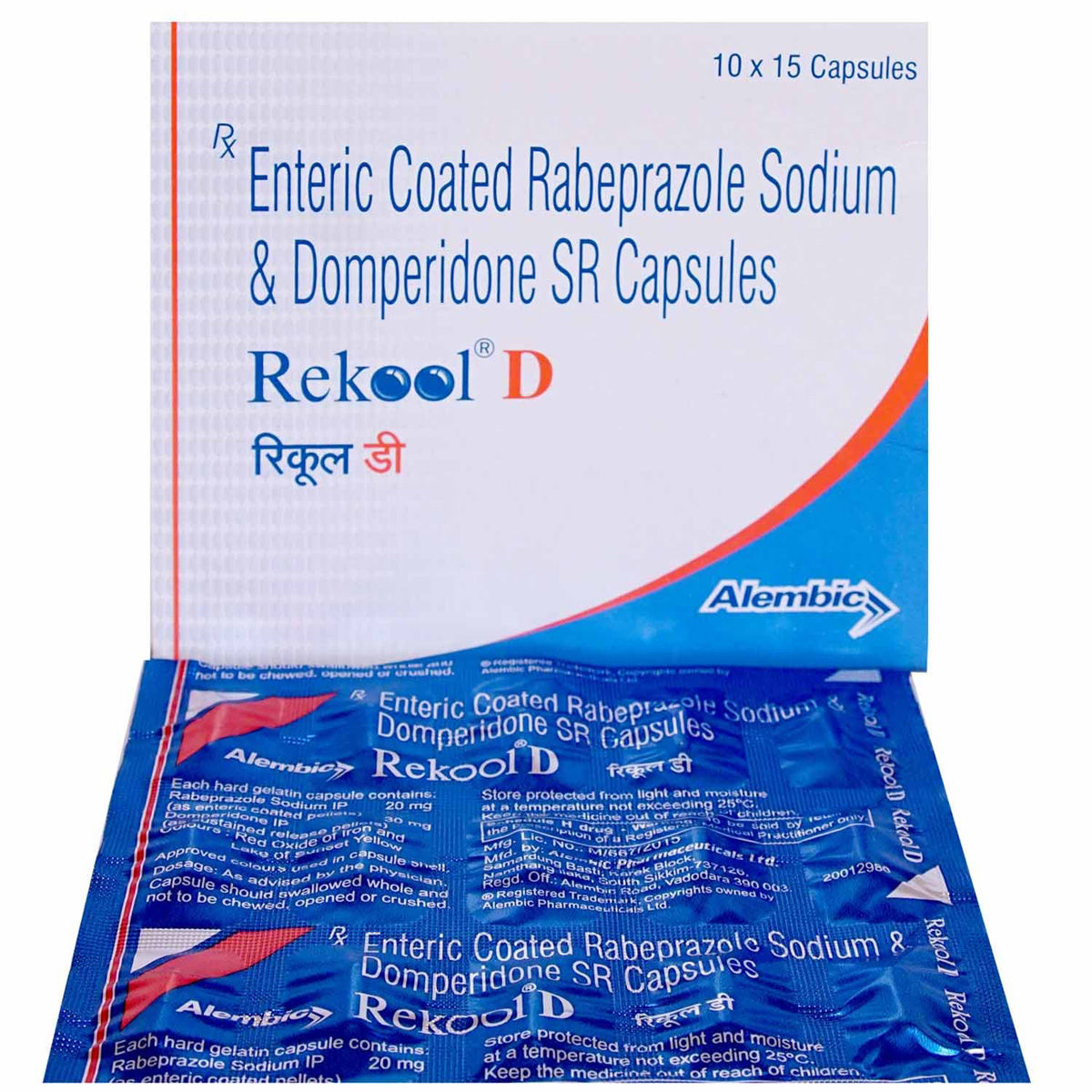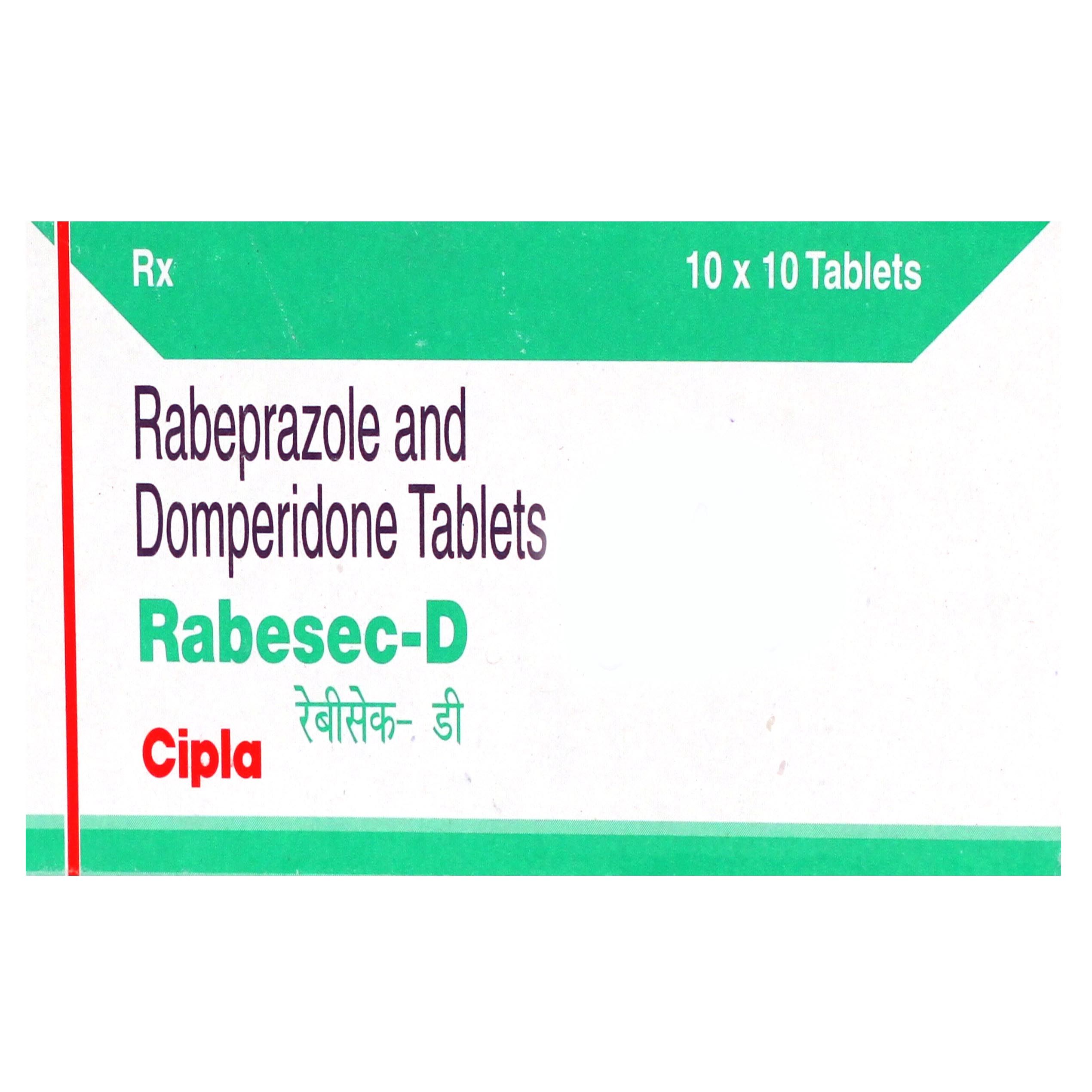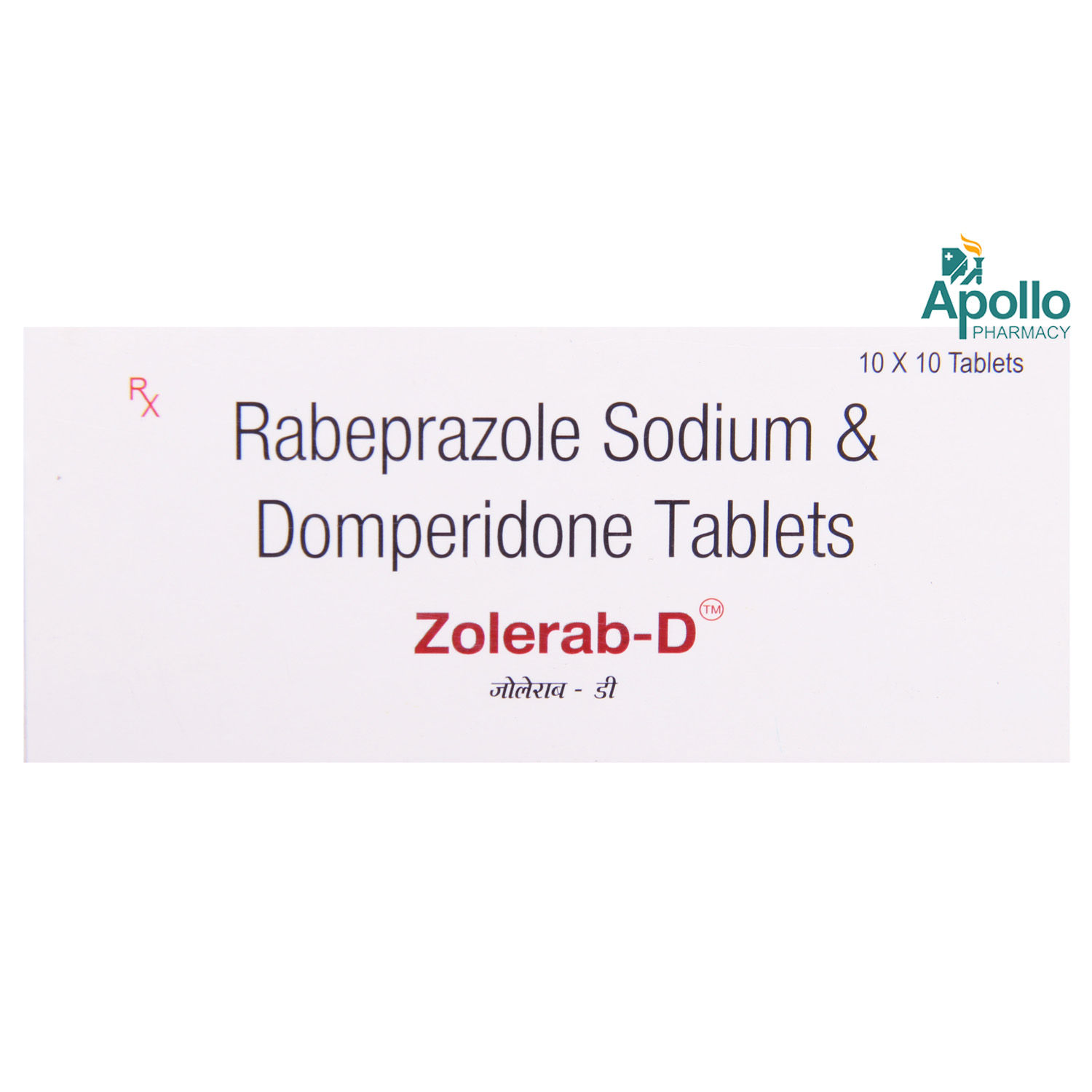Rabidoc-D Tablet 10's
₹126*
MRP ₹140
10% off
₹119*
MRP ₹140
15% CB
₹21 cashback(15%)
Free Delivery
With Circle membership
(Inclusive of all Taxes)
This offer price is valid on orders above ₹800. Apply coupon PHARMA10/PHARMA18 (excluding restricted items)
Know Your Delivery Time
Provide Delivery Location


Whats That

Secure Payment

India's Most Trusted Pharmacy

Genuine Products
Composition :
Manufacturer/Marketer :
Consume Type :
Return Policy :
Expires on or after :
About Rabidoc-D Tablet
Rabidoc-D Tablet is used to treat symptoms of acid reflux due to hyperacidity, stomach ulcer (Peptic ulcer disease), and Zollinger-Ellison syndrome (overproduction of acid due to a pancreatic tumour). Besides this, it is used short-term to treat gastroesophageal reflux disease (GERD) symptoms. GERD is a condition in which the sphincter (valve) located at the uppermost part of the stomach gets irritated and damaged due to excessive stomach acid production. As a result, the stomach acid and juice flow back into the food pipe, leading to stomach upset and heartburn. Heartburn is the post-effect of acid reflux with a burning-like feeling that rises from the stomach towards the neck.
Rabidoc-D Tablet contains two medicines, namely Rabeprazole and Domperidone. Rabeprazole is a proton pump inhibitor that helps reduce stomach acid by blocking the actions of an enzyme (H+/K+ ATPase or gastric proton pump). This gastric proton pump lies in the cells of the stomach wall. It is responsible for releasing gastric acid secretion and damaging tissues in the food pipe, stomach, and duodenum (uppermost part of the small intestine). On the other hand, Domperidone is a prokinetic agent that increases the motility of the upper gastrointestinal tract and blocks the vomiting-inducing centre (chemoreceptor trigger zone-CTZ).
It is better to take Rabidoc-D Tablet an hour before a meal or without a meal for its best results. Rabidoc-D Tablet should be swallowed whole with a glass of water. Do not chew, crush, or break it. You should keep taking this medicine for as long as your doctor recommends. If you stop treatment too early, your symptoms may come back, and your condition may worsen. An adult taking Rabidoc-D Tablet might have common side effects like headache, diarrhoea, nausea, abdominal pain, vomiting, flatulence, dizziness, and arthralgia (joint pain). In the case of children taking Rabidoc-D Tablet , they might report upper respiratory tract infections (URI), headache, fever, diarrhoea, vomiting, rash, and abdominal pain. These side effects are temporary and may resolve after some time; however, if this persists, contact the doctor.
You can increase the efficacy of Rabidoc-D Tablet by taking a small meal or snacks frequently. Avoid caffeine-containing beverages (coffee, tea), spicy/deep-fried/processed foods, carbonated drinks, and acidic foods like citrus fruits/vegetables (tomatoes). Tell your doctor if you have stomach or intestinal cancer, liver problems, are allergic to Rabidoc-D Tablet or will have an endoscopy in the future. Prolonged intake of Rabidoc-D Tablet may cause a deficiency of Vitamin B-12 and low levels of calcium, magnesium, and Vitamin D, leading to osteoporosis (brittle or weak bones).
Uses of Rabidoc-D Tablet
Directions for Use
Medicinal Benefits
Rabidoc-D Tablet helps in reducing the excess amount of stomach. In turn, it prevents the formation of an ulcer in the upper part of the intestine (duodenal ulcer), gastro-esophagal reflux disease (GERD) with or without ulcer and Zollinger-Ellison Syndrome, in which the stomach makes exceptionally high amounts of acid. Besides, the Rabidoc-D Tablet also treats symptoms of nausea and vomiting in adults and children over 12 years of age (with at least 35 kg or more).
How Rabidoc-D Tablet Works
Storage
Side Effects of Rabidoc-D Tablet
Rash
Brittle bones
Low vitamin B-12
Loss of libido (sexual desire)
Cough
Sore throat
Runny nose
Flatulence (gas formation)
Back pain
Weakness or loss of strength
Sleeplessness
Headache
Dizziness
Benign polyps in the stomach
What if I have taken an overdose of Rabidoc-D Tablet
Drug Warnings
You should avoid taking Rabidoc-D Tablet if you are allergic to Rabidoc-D Tablet or proton pump inhibitors, have gastric cancer, liver disease, low magnesium level (osteoporosis), low vitamin B12, are pregnant or planning for pregnancy, and breastfeeding mothers. Rabidoc-D Tablet may interact with a blood thinner (warfarin), antifungal (ketoconazole), anti-HIV drug (atazanavir, nelfinavir), iron supplements, ampicillin antibiotic, anti-cancer drug (methotrexate). Let your doctor know if you are taking these medicines. Prolonged intake of Rabidoc-D Tablet may cause lupus erythematosus (an inflammatory condition in which the immune system attacks its tissues), Vitamin B-12, and magnesium deficiency. Intake of Rabidoc-D Tablet may mask the symptom of gastric cancer, so if you have any severe stomach pain or gastric bleeding (blood in mucous or stool), immediately consult the doctor. Tell your doctor that you are using before having a specific blood test known as Chromogranin A.
Drug-Drug Interactions
Drug-Food Interactions
Diet & Lifestyle Advise
Avoid intake of acid or heartburn-triggering foods or drinks like onions, peppermint, chocolate, caffeinated beverages, citrus fruits or juices, tomatoes and high-fat and spicy foods.
Avoid taking alcohol and smoking cigarette. Alcohol can raise the level of production of stomach acid leading to heartburn and acid reflux. On the other hand, nicotine smoking damages the valve (sphincter), preventing stomach acid backflow into the food pipe.
Avoid regular sitting continuously, as it can increase stomach acid production. Try to take a break of 5 minutes in 1 hour by brisk walking or stretching.
Before going to sleep, try to raise your bedhead so that your head and chest are higher than your feet. Do not use piles of pillows, instead, one raised block is fine. This will not allow the stomach acid to backflow through your food pipe.
Include high fibre containing foods, berries, cherries, leafy green veggies (kale, spinach) and black peppers in your meal. These foods are full of antioxidants, calcium and vitamin B 12 that can help cope with the long-term effects of the medicine. Fermented dairy products like miso, sauerkraut, and kimchi contain probiotics which help in the prevention of excess stomach acid production. Cranberry juice can be beneficial in the peptic ulcer and H Pylori infection.
Habit Forming
Therapeutic Class
Rabidoc-D Tablet Substitute

Rekool D Capsule 15's
₹17.31per tabletRabicer-D Tablet 10's
₹13.59per tabletPenrab-D Tablet 15's
₹16.74per tabletPenrab-D Capsule 10's
by AYUR
₹6.84per tabletRabesec-D Tablet 10's
₹12.20per tablet
Product Substitutes
Alcohol
Caution
Drinking alcohol with Rabidoc-D Tablet may cause dehydration and elevate the level of stomach acid, thereby decreasing its efficiency. So try to avoid, limit alcohol or contact a doctor before intake of Rabidoc-D Tablet .
Pregnancy
Caution
It is not known whether the Rabidoc-D Tablet affects the baby or not. So, contact a doctor before intake of Rabidoc-D Tablet . Your doctor will weigh the benefits and potential risks before prescribing them.
Breast Feeding
Caution
Domperidone present in Rabidoc-D Tablet passes into the breast milk. However, no evidence of risk has been reported. Please consult your doctor before intake of Rabidoc-D Tablet . Your doctor will weigh the benefits and potential risks before prescribing them.
Driving
Caution
In some cases, Rabidoc-D Tablet may cause dizziness, sleepy, or blur vision. If you observe these symptoms do not drive or operate heavy machinery until you feel better.
Liver
Caution
If u have or had history or evidence of any liver-related diseases, please consult the doctor before taking medicine.
Kidney
Caution
If u have or had history or evidence of any kidney-related diseases, please consult the doctor before taking medicine.
Children
Caution
Rabidoc-D Tablet is not recommended for use in children due to a lack of data on safety and efficacy. Please consult your doctor.
FAQs
Country of origin
Manufacturer/Marketer address
Customers Also Bought
Disclaimer
Author Details
We provide you with authentic, trustworthy and relevant information






























